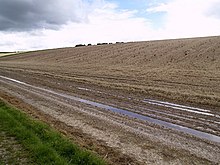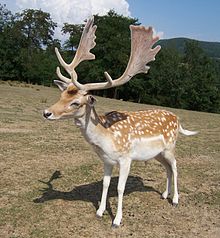fallow
English
Pronunciation
- Lua error in Module:parameters at line 95: Parameter 1 should be a valid language or etymology language code; the value "UK" is not valid. See WT:LOL and WT:LOL/E. IPA(key): /ˈfæləʊ/
- Lua error in Module:parameters at line 95: Parameter 1 should be a valid language or etymology language code; the value "US" is not valid. See WT:LOL and WT:LOL/E. enPR: fălʹō, IPA(key): /ˈfæloʊ/
- Rhymes: -æləʊ
Etymology 1

From Middle English falow, from Old English fealh (“fallow land”), from Proto-Germanic *falgō (compare Saterland Frisian falge, Dutch valg, German Felge), from Proto-Indo-European *polḱéh₂ (“arable land”) (compare Gaulish olca, Russian полоса́ (polosá)).
Noun
fallow (countable and uncountable, plural fallows)
- (agriculture, uncountable) Ground ploughed and harrowed but left unseeded for one year.
- (agriculture, uncountable) Uncultivated land.
- The ploughing or tilling of land, without sowing it for a season.
- (Can we date this quote by Sinclair and provide title, author’s full name, and other details?)
- By a complete summer fallow, land is rendered tender and mellow. The fallow gives it a better tilth than can be given by a fallow crop.
- (Can we date this quote by Sinclair and provide title, author’s full name, and other details?)
Derived terms
Translations
|
|
- The translations below need to be checked and inserted above into the appropriate translation tables. See instructions at Wiktionary:Entry layout § Translations.
|
Adjective
fallow (comparative more fallow, superlative most fallow)
- (of agricultural land) Ploughed but left unseeded for more than one planting season.
- (of agricultural land) Left unworked and uncropped for some amount of time.
- (figurative) Inactive; undeveloped.
- a fallow period in one's career
Synonyms
- (figuratively inactive): abeyant, dormant, latent; see also Thesaurus:inactive
Derived terms
Translations
|
|
Etymology 2
From Middle English falowen, falwen, from Old English fealgian (“to fallow; break up land”), from Proto-Germanic *falgōną (“to fallow”). Cognate with Dutch valgen (“to plow lightly; fallow”), German Low German falgen (“to till; dig a hole”).
Verb
fallow (third-person singular simple present fallows, present participle fallowing, simple past and past participle fallowed)
- (transitive) To make land fallow for agricultural purposes.
Derived terms
Translations
|
Etymology 3

From Middle English falwe, from Old English fealu, from Proto-Germanic *falwaz (compare West Frisian feal, Dutch vaal, German falb, fahl), from Proto-Indo-European *polwos (compare Lithuanian pal̃vas (“sallow, wan”), Russian половый (polovyj, “wan, light yellow”), Serbo-Croatian plâv (“blond, blue”), Ancient Greek πολιός (poliós, “grey”)), from Proto-Indo-European *pel- (“pale”).
Adjective
fallow (comparative more fallow, superlative most fallow)
- Of a pale red or yellow, light brown; dun.
- a fallow deer or greyhound
- fallow:
- a. 1597, William Shakespeare, The Merry Wives of Windsor, Act 1, Scene 1:
- How does your fallow greyhound, sir?
Related terms
Translations
|
References
- Douglas Harper (2001–2024) “fallow”, in Online Etymology Dictionary.
- English 2-syllable words
- English terms with IPA pronunciation
- Rhymes:English/æləʊ
- English terms inherited from Middle English
- English terms derived from Middle English
- English terms inherited from Old English
- English terms derived from Old English
- English terms inherited from Proto-Germanic
- English terms derived from Proto-Germanic
- English terms inherited from Proto-Indo-European
- English terms derived from Proto-Indo-European
- English lemmas
- English nouns
- English uncountable nouns
- English countable nouns
- en:Agriculture
- Requests for date/Sinclair
- English adjectives
- English terms with usage examples
- English verbs
- English transitive verbs
- English terms with quotations
- English terms with multiple etymologies
